PQQ, short for pyrroloquinoline quinone, is a biologically-active compound that can be taken as a supplement to fight oxidative damage, boost your cognitive performance and protect your brain from free radicals, protect the function of your mitochondria, and protect you from chronic disease.
These very broad benefits are the result of PQQ’s involvement in many of the critical biological reactions in your body.
If you want a versatile supplement that will boost your physical energy levels, increase your cognitive function, and improve your long-term health, PQQ is a great way to go.
Our researchers have looked at the ten best PQQ supplements and ranked them according to quality.
Research
Rankings
1. Doctor’s Best PQQ
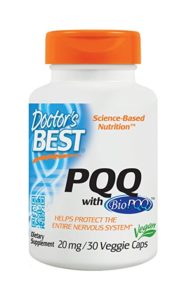
Doctor’s Best has one of the cleanest PQQ supplements out there. Each vegetable cellulose capsule delivers 20 mg of the proprietary “BioPQQ” disodium salt form of PQQ, and aside from the cellulose that makes up the capsule, there are zero additional ingredients.
This making Doctor’s Best PQQ an excellent choice for anyone who prioritizes simple and minimal supplement design. In terms of design, it doesn’t get any cleaner than this.
2. Health Thru Nutrition Naturally PQQ
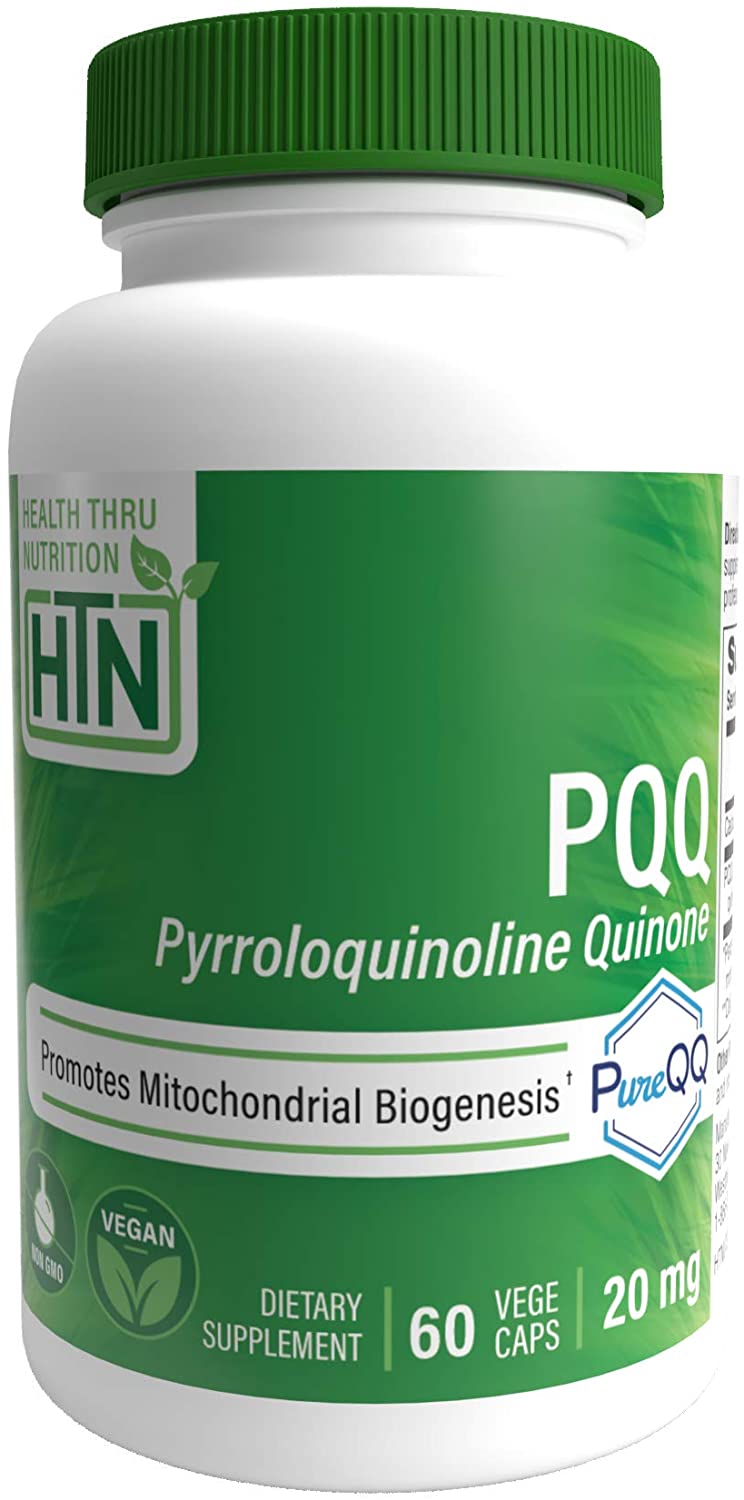
Health Thru Nutrition has a PQQ supplement that delivers 20 mg of pure PQQ per vegetarian capsule, alongside a small amount of calcium and a minimal amount of other fillers and binders.
It’s a popular and reliable PQQ supplement, making it well-suited for anyone looking for a pure and simple product.
3. Life Extension PQQ Caps
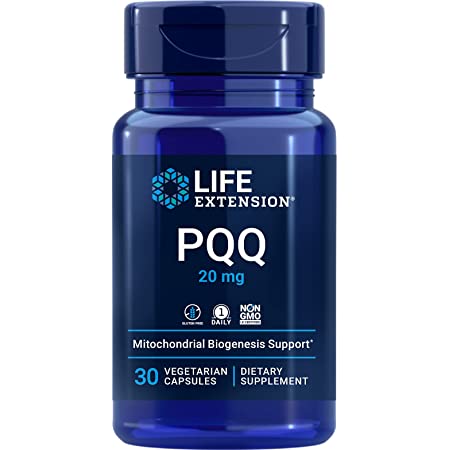
Life Extension is known for their high quality and straightforward products for longevity and healthy aging, and that reputation certainly applies to their PQQ supplement.
With 20 mg of PQQ in a disodium salt form and no other active ingredients, you don’t have to worry about anything else interfering with the biological activity of the PQQ. The supplement design is pretty clean, too, without much in the way of additives or binders. It’s an all-around great choice for PQQ.
4. Jarrow Formulas PQQ
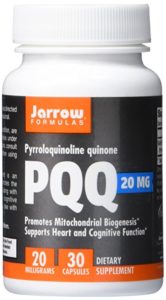
Jarrow Formulas has a pretty standard PQQ supplement; its only distinguishing factor is that its capsule is constituted of gelatin instead of the more vegetarian-friendly cellulose in some of its competitors.
This won’t be a deal-breaker for most people, and it’s still a high quality product with 20 mg of PQQ per capsule.
5. Element Nutraceuticals PQQ
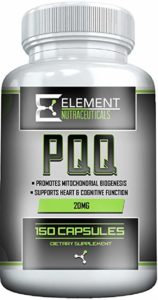
Element Nutraceuticals makes a PQQ supplement that’s among the most simple, and is perhaps the most simple PQQ supplement on the market that delivers PQQ in its pure form as opposed to the disodium salt form of the supplement.
The capsules are made of gelatin, and aside from that, the only other ingredient is rice flour. If you want pure PQQ, not the disodium salt form, this should be your choice.
6. Pure Encapsulations SR-CoQ10 with PQQ
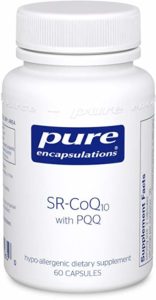
Pure Encapsulations makes an interesting PQQ supplement that combines the mitochondrial energy promoting effects of PQQ with the antioxidant power of CoQ10.
If you are interested in both of these supplements for their potential longevity-promoting effects, this would be a good choice, as you get 20 mg of PQQ and 100 mg of CoQ10 per capsule, and aside from these two active ingredients, you don’t get much in the way of additives, which is often a problem with combined supplements.
7. Mitogenesis Super PQQ Liquid
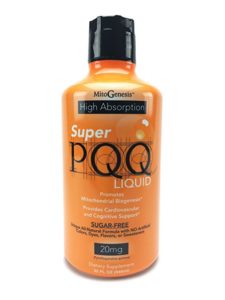
MItogenesis has an interesting take on PQQ: instead of delivering it in a capsule like almost all other PQQ supplements, this product delivers it in liquid form.
The PQQ is dissolved in a flavored water mixed with monk fruit extract and natural mango flavoring. For a liquid supplement, the ingredient composition is actually pretty good: there’s nothing in the way of artificial ingredients or additives.
There’s 20 mg of PQQ per fluid ounce of solution, which makes measuring a little easier, but this supplement still suffers from the dosing issue: without precision measuring tools, it’s hard to ensure a precise dose.
8. Dr. Mercola Berberine and MicroPQQ
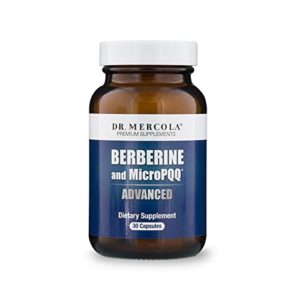
There are a few supplements on the market that combine PQQ with other biologically active compounds, including Dr. Mercola Berberine and MicroPQQ.
Some make sense, but berberine (an herbal extract from a European plant) is a less logical combination when it comes to PQQ. There are plenty of benefits to berberine, but most of them don’t quite line up with the benefits of PQQ, so it doesn’t make a whole lot of sense to deliver them at the same time, unless you are specifically looking for both of these disparate ingredients in one supplement.
Even so, there are better options for each individually, and the PQQ content (10 mg) is lower than many other competitors.
9. Dr.’s Hope PQQ + CoQ10
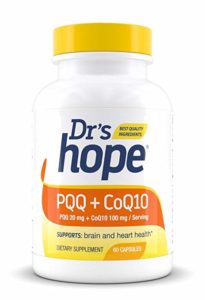
Combining the mitochondrial boosting effects of PQQ with the antioxidant power of CoQ10 is popular, and Dr.’s Hope is one brand that tries to capitalize on this combo.
The dosages of the active ingredients are solid (100 mg of CoQ10 and 20 mg of PQQ) but the supplement design isn’t the cleanest.
There’s a few too many additives, especially considering the fact that other companies make similar supplements with less in the way of binders and fillers.
10. Designs for Health Mito-PQQ
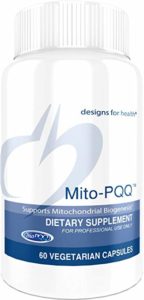
Designs for Health is another PQQ combo supplement; this one combines PQQ with rhodiola rosea, an herbal extract known mostly for its ability to boost cognitive function, increase libido, and burn fat.
While these are all plenty worthwhile objectives, they don’t quite line up with the uses of PQQ, which makes this somewhat of an odd pairing.
Category winners
Best PQQ overall: Doctor’s Best PQQ
Doctor’s Best PQQ is a well-designed, minimalist PQQ supplement with an effective dosage and no extraneous ingredients. That’s exactly what you’re looking for when taking a targeted compound like PQQ, which is why this supplement takes the top spot.
Best PQQ for cognitive function: Life Extension PQQ Caps
Whether you’re aiming for a short-term nootropic effect or long-term protection of cognitive function, Life Extension PQQ Caps are a great option. The 20 mg dosage is solid, and there are no secondary ingredients that might have unwanted effects on your cognitive function and performance.
Best PQQ for energy levels: Pure Encapsulations SR-CoQ10 with PQQ
Need a PQQ supplement for feelings of sluggishness, tiredness, or lethargy? Pure Encapsulations SR-CoQ10 with PQQ is our recommendation due to its combination of a special form of CoQ10 with PQQ. This combo is designed to provide an extra boost to mitochondrial function and augment your overall energy levels.
Best PQQ for immune function: Doctor’s Best PQQ
Boosting immune function and fighting off respiratory infections is one of the primary reasons people take PQQ, and for this purpose we recommend Doctor’s Best PQQ. The 20 mg dosage and vegan-friendly cellulose capsules make this PQQ supplement suitable for anyone looking for an immunity boost.
Best PQQ for fighting inflammation: Doctor’s Best PQQ
For leveraging the antioxidant and anti-inflammatory effects of PQQ, our top pick really shines: its simple formulation means the PQQ can be rapidly absorbed by your body and the 20 mg dosage is exactly what you’d want when taking PQQ for inflammation.
Best PQQ for longevity: Life Extension PQQ Caps
PQQ’s powerful antioxidant and anti-inflammatory effects make it a popular component of anti-aging and longevity supplementation stacks. For this use case we recommend Life Extension PQQ Caps thanks to its high dosage and pure formulation, which ensures it plays well with other supplements in your regimen.
Who should buy PQQ?
PQQ is generally considered safe for most people and can help protect your body from oxidative damage, improve your brain, and prevent heart damage. It can also help improve brain health and energy in certain individuals.
While interactions are limited, it’s best to speak to your doctor before beginning a supplement regimen with PQQ, just to be safe. Special populations such as diabetics, children, and pregnant women should avoid PQQ until more conclusive research comes out surrounding the efficacy and safety of PQQ supplementation in these populations.
How we ranked
When ranking the best PQQ supplements on the market, we first looked at dosages. According to research, up to 60mg of PQQ can be consumed per day. However, we preferred a lower dose of 20mg that can be split up over the day and tailored to an individual. This is why products like Jarrow Formula’s and Life Extension ranked so well on our list.
Next, we looked at fillers and ingredients. Purity was king for us, which is why you won’t find any supplement blends on our list. We also preferred products that provided third-party lab testing results, like Doctor’s Best, and included no artificial ingredients, fillers, or additives. While many companies looked to include CoQ10, we did prefer companies that included pure PQQ for our rankings, without any other ingredients – even if they are beneficial.
The form of PQQ was also important to consider. While standard PQQ wasn’t frowned upon, companies that used the more advanced form called BioPQQ were rewarded, which is why Doctor’s Best took the top spot on our list.
Benefits
PQQ promotes growth and connective tissue function. The importance of PQQ wasn’t realized until fairly recently.
PQQ is present in trace amounts in many foods, so detecting the effects of a PQQ deficient diet was challenging. A 1989 study by researchers at the University of California Davis examined this in detail by feeding lab mice a diet that was specifically designed to be devoid of PQQ (1).
The study appeared in the prestigious journal Science, compared the growth and development of mice fed a standard diet to mice fed the specially designed PQQ-deficient diet.
PQQ deficiency resulted in markedly decreased growth and substantial damage to connective tissue like skin, tendons, and ligaments. This prompted the researchers to conclude that PQQ functions like a growth factor, enabling tissue repair and growth.
This effect appears particularly important for collagen-containing tissue, like tendons, cartilage, and skin. In addition to more traditional collagen-targeting compounds like glucosamine or other joint supplements, PQQ might be helpful for improving the quality of your connective tissue.
PQQ protects your body from oxidative damage. The discovery of the nutritional importance of PQQ sparked a flurry of scientific research into its biological functions.
A review published in 2016 in the scientific journal Bioscience, Biotechnology, and Biochemistry summarized some of these functions, highlighting the ability of PQQ to fight oxidative damage in your body (2).
Oxidative damage is a chemical process that’s been connected to aging, chronic diseases, and cancer, among other ill health effects. The nutritional benefits of more traditional and widely-recognized nutrients like vitamin C and vitamin E are thought to be, in large part, due to their ability to prevent or reduce oxidative damage.
So, what’s the evidence for PQQ specifically? PQQ seems to protect vitally important biological structures like mitochondria and neural tissue from damage by free radicals, according to one study published in the journal Biochemical and Biophysical Research Communications (3).
This study found that PQQ exerted a strong protective effect on mitochondria from rat heart tissue, indicating that PQQ can help preserve heart health. Other research has found that the antioxidant effects of PQQ are even stronger than those of vitamin C or vitamin E (4).
PQQ helps preserve and improve brain function. One of the types of cells that PQQ seems particularly adept at protecting from oxidative damage is neural tissue, which is found in copious quantities in your brain.
Naturally, this led scientists to wonder whether PQQ could be used to help heal damage to the brain or even improve brain function beyond its normal level.
Some of the initial research into PQQ and cognitive function used rat models to study the effects of PQQ on oxidation-induced damage to the brain. A study published in 2008 by researchers in Japan used excessive atmospheric oxygen levels to induce oxidative damage to rats, then studied how their cognitive performance changed using a maze navigation test (5).
In their experiment, some rats were given a PQQ supplement as a part of their normal diet, while other rats served as controls, and were not given PQQ. The researchers found that the rats given PQQ did not suffer as much brain damage, and learned to navigate the maze better than mice not given the PQQ supplement.
PQQ improves mitochondrial function and can protect your heart. Mitochondria are structures inside cells in your body that produce energy.
They’re particularly important for muscular function, and this extends beyond your skeletal muscles—your heart is a muscle too, and it relies on mitochondrial function. Research published in 2007 by a team of scientists at the University of California San Francisco demonstrated that PQQ exerts protective effects on the mitochondria found in heart cells using a rat model (6).
In the presence of low concentrations of PQQ, cardiac cells are protected against the effects of oxidative damage. This suggests that PQQ could serve as a protective agent against damage to your heart, and may even be able to reduce the risk or reverse some of the effects of cardiovascular disease, though more clinical research is needed to provide evidence for this.
Side effects
Due to its relatively recent discovery, there haven’t been any rigorous investigations into the side effects of PQQ in the form of a clinical trial.
However, according to research published in 2015 by scientists at Osaka Prefecture University in Japan, a large number of animal studies and a small number of human trials have not found any toxic effects, even though the animal studies used very high doses (7).
Additionally, PQQ has been on the commercial supplement market since 2009 and the FDA has noted no negative side effects related to PQQ. Thus far, the safety profile of PQQ looks strong.
Recommended dose
So far, human studies are few and far between. The only human studies so far have used dosages ranging from 20 to 60 mg per day.
Given that the usual PQQ supplement comes in a 20 mg dosage, this would translate into one to three capsules per day, which ought to be equally spaced throughout the day if you are taking more than one capsule.
As with other supplements that are on the cutting edge of research, it makes the most sense to start with a low dosage of PQQ and increase it gradually if you aren’t seeing the benefits you’d like.
FAQ
Is PQQ important in the body? PQQ, which you may also see referred to as pyrroloquinoline quinone, can be used to fight oxidative damage, improve your body’s energy production capacity, and protect or even improve your cognitive function.
Though it might seem like a fairly obscure biologically active chemical, it plays a critical role in the regulation of some of the most fundamental functions of your body. There is even some discussion about whether it should be classified as a vitamin, because it’s not synthesized in your body naturally—you need to get it from either food or a supplement.
What is PQQ? Pyrroloquinoline quinone (PQQ) is a compound that exhibits the activity of Vitamin B and antioxidants. Even though it is considered an essential vitamin, the human body cannot create or synthesize PQQ on its own. As part of the Vitamin B family, the body needs PQQ to help support various vital bodily systems and functions related to immune, neurological, and cardiovascular health.
Without adequate PQQ, essential physical systems may not function efficiently and may degenerate to an unhealthy degree. Although humans cannot make this essential nutrient themselves, it is possible to obtain the necessary daily amounts from other sources, such as your diet and supplements.
Is PQQ found in nature, or is it lab-grown? PQQ is found in nature, and is also grown synthetically. It’s likely you already eat small amounts of PQQ each day, as it is found in plants and many common foods. While you can find some level of PQQ in most foods, some are particularly rich with the nutrient. Foods such as parsley, kiwis, green peppers, bananas, papaya, fava beans, and soy contain higher levels of PPQ than other fruits, vegetables, and legumes.
While it is possible to get enough PQQ through diet alone, it is not always convenient and may be expensive. Most supplements provide between 20 mg-40 mg of PQQ per pill, whereas the average foods many people eat daily may provide just between 0.19−7.02 ng (ng stands for a nanogram, and a nanogram is one billionth of a gram (8)).
As an alternative, you can purchase synthetic PQQ, which may be more convenient to take and costs less than buying foods that are rich in the nutrient.
Why do I need PQQ in my diet? PQQ supports many vital functions in the human body. As you cannot make this essential vitamin naturally, it is necessary to include it in your diet. Studies have shown that animals who have a diet deficient in PQQ have limitations on growth and reproduction (9).
PQQ contributes to mitochondrial regeneration and growth, and mitochondria, which are the powerhouses of our cells, help the body to function optimally. PQQ can help the nervous system, by boosting levels of mitochondria, and have a beneficial effect on neurological health in areas such as memory. As mitochondria are present in nearly every cell in the human body, PQQ may help support almost every vital bodily function.
Can PQQ help to lower stress levels? A study involving 17 male and female participants supports the suggestion that PQQ can help to reduce stress levels. Each subject received 20 mg of PQQ each day for eight weeks. At the end of the study, researchers found that the subject’s stress levels were lower than before they had received the PQQ (10).
Furthermore, the researchers measured the amount of cortisol secretion in the participants. When feeling pressure or stress, humans tend to produce higher amounts of cortisol. According to the above study, cortisol secretions reduced following the administration of PQQ.
Can PQQ help me as part of an exercise regimen? PQQ can help as part of a healthy lifestyle by assisting the body to recover after exercise. One of the results of strenuous physical activity is that muscle fibers break down, and they can become inflamed. There is research-based evidence that demonstrates PQQ can help to reduce inflammation by reducing the amounts of specific proteins and amines (11).
This conclusion is likely as a result of the powerful antioxidant effects of PQQ, thought to be between 30-100 times more efficient than Vitamin C. As Vitamin C is a potent antioxidant, this could be a significant finding for both professional and recreational athletes.
Can PQQ offer protection against illness? The human body requires vitamins and nutrients to help it fight off illness and disease. There is evidence that PQQ may reduce the symptoms of Alzheimer’s disease by regenerating cells, and also by suppressing the effects of proteins that experts believe contribute to cell death (12). Furthermore, research suggests PQQ could have a role to play in therapy following a stroke.
Physicians measure infarct size following a patient having a stroke, and this study shows that the size reduced following the administration of PQQ (13). Infarct size refers to the area of necrotic, or dead tissue in the brain after a stroke.
Depending on the area and size of the infarct, patients may display different symptoms and have varying therapeutic outcomes. Experts believe the smaller the area of dead tissue, the better in terms of chance of recovery. They think PQQ may act as a neuroprotective for brain tissue, which could play a significant role in medical treatment following a stroke.
Can PQQ help with skin conditions? PQQ may help to encourage healthy and supple skin. Scientists have found that a diet that does not contain PQQ can cause the skin to become fragile (14).
As researchers have also demonstrated that one of the primary effects of PQQ is to stimulate mitochondria generation, this also suggests there are benefits for skincare (15).
If mitochondria do not provide energy to cells, they can become weaker and may die. By encouraging the growth of mitochondria, PQQ may help to provide necessary vitality to skin cells, maintaining their strength and improving your ability to fight conditions such as dry or flaky skin.
Does PQQ encourage better sleep? There are several ways to help improve sleep, and PQQ might play a vital role. Your bodily systems need support to function correctly. If this support is missing, your functions can deteriorate, and your body may lose its natural balances and rhythms.
By helping skin to stay healthy, contributing to resisting illnesses, encouraging muscle recovery after physical exercise, and reducing cortisol released during stressful situations, PQQ can help your body to maintain its equilibrium.
Stress, illness, and other negative factors can cause a disturbance in your sleep patterns. PQQ may help reduce the effects of many uncomfortable conditions and contribute to a better night’s sleep.
Can PQQ give me more energy? Research suggests that PQQ can help to support energy levels and that a diet that is deficient in PQQ could cause a decrease in vitality (16).
The positive effects on mitochondria support the suggestion that cell growth and proliferation benefit from PQQ. However, there may be other benefits that come from the contribution of PQQ to several essential bodily processes.
If you have a miserable night’s sleep, you tend to feel sluggish the next day. Similarly, if you are sick, your body uses energy to fight the illness, which can subsequently make you feel less energetic. By supporting these processes, PQQ can offer a comprehensive approach to wellness that encourages natural homeostasis and increases energy levels throughout the day.
Should I include PQQ in a heart-healthy diet? If you’re already living a healthy lifestyle and embracing a diet that is healthy for your cardiovascular system, you can still benefit from the effects of PQQ. Science has already proven that exercise and fruit and vegetables contribute to a virile system, but research now suggests that PQQ may help to enhance these effects (17).
Oxidative stress causes cell death, which can damage your cardiovascular system. While PPQ alone cannot prevent this from occurring, it is worth including PQQ into your comprehensive healthy diet and exercise plan.
Can I take PQQ if I have high cholesterol? Yes, taking a PQQ supplement may help you to reduce your cholesterol levels. It’s well-known that having high cholesterol can increase your risk of certain conditions such as heart disease, stroke, and cardiac arrest. Reducing cholesterol levels usually requires pharmaceutical drugs known as statins.
While you should never stop taking prescribed medication without first consulting your physician, you can include PQQ as part of a balanced diet. Researchers carried out a study by administering 20mg PQQ daily for 12 weeks to 29 healthy Japanese adults who had slightly abnormal cholesterol levels (18).
The scientists found at the trial’s conclusion that there was a significant decrease in the LDL levels of cholesterol. Experts link LDL to several severe lifestyle conditions, such as atherosclerosis. This condition occurs when fat builds up in the arteries, causing them to narrow. If left untreated, this can increase the risk of peripheral artery disease, heart attack, and stroke. Using PQQ may help lower your LDL levels, reducing your risk of serious illness or chronic disease.
What dosage of PQQ should I take? PPQ may have benefits at as low as 2 mg. However, this is a low dose, and supplements regularly provide doses between 20 and 40 mg.
To obtain the most advantageous benefits, sustain cell energy, and encourage cell regeneration and growth, your body may benefit from the higher doses contained in PQQ supplements – which is why all the products in our rankings provide at least 20mg per serving..
Do I need to use other supplements along with PQQ? No evidence suggests taking other supplements can enhance the effects of PQQ. Research suggests that PQQ can resist the effects of cognitive decline and that this response can occur even if you do not use other supplements while you are using PQQ (19).
You can include PQQ as part of a healthy lifestyle, and it may help improve many aspects of your health, including brain function, cardiovascular health, and your immune system. However, although you can combine it with other supplements, this is not necessary.
Why is it important that I take PQQ supplements? PQQ doesn’t just benefit one area of the body; it can affect many different systems through its action on mitochondria. As you can’t synthesize it naturally, a supplement is a convenient, easy, and affordable way to obtain your recommended daily dose.
Related articles
Recap
PQQ is a new and exciting supplement that is an important antioxidant, growth factor, and protective agent for neural and cardiac tissue.
It could be useful for preventing or reversing damage to cognitive function, heart function, and the structural integrity of connective tissue like skin, tendons, and collagen.
While research into PQQ is in the early stages, it appears to have a good safety profile, and early indicators are pointing towards doses in the range of 20 to 60 mg per day.
Given the wide range of potential uses for this supplement, PQQ has a bright future.
For BodyNutrition’s #1 recommended PQQ supplement, click here.